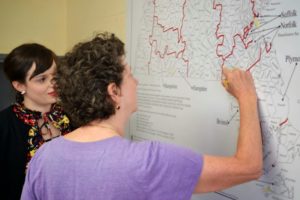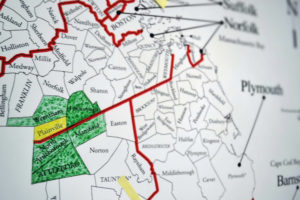Guest Blog from SEIGMA: How Slot Parlor Selection Affects the SEIGMA Research Study
- March 13, 2014
- by MGC Communications
- 0 comments
![]() Like many in the Commonwealth, we on the SEIGMA research team have been waiting for the announcement of the slots parlor license. Our offices feature a large map of Massachusetts hanging on a wall, with sticky tabs marking potential host and surrounding communities not just for the slots parlor but for the casinos as well (sounds a bit low-tech, but there’s nothing like the visual of a big map). We have been in dialogue for months about the best way to collect and analyze data depending on the outcome. Several of us were in Boston on Thursday when the slot parlor license announcement was made and we were excited to contact our collaborators and fellow team members to announce the news and roll out the next phase of our study.
Like many in the Commonwealth, we on the SEIGMA research team have been waiting for the announcement of the slots parlor license. Our offices feature a large map of Massachusetts hanging on a wall, with sticky tabs marking potential host and surrounding communities not just for the slots parlor but for the casinos as well (sounds a bit low-tech, but there’s nothing like the visual of a big map). We have been in dialogue for months about the best way to collect and analyze data depending on the outcome. Several of us were in Boston on Thursday when the slot parlor license announcement was made and we were excited to contact our collaborators and fellow team members to announce the news and roll out the next phase of our study.
We grew even more excited later that night when two of our team members, Rachel Volberg and Laurie Salame, participated in an event called “WBUR on Tap!” facilitated by Morning Edition anchor Bob Oakes. The event, which was an informal gathering of about 80 people in WBUR’s studios, featured a discussion of gambling and its implications for the culture of the Commonwealth. In addition to questions raised by Mr. Oakes, members of the audience were encouraged to ask questions and share their thoughts and concerns about gambling expansion. It was a lively discussion, underscoring the fact that citizens across the state, especially those that may host or surround the new gaming venues, want balanced information about how this will impact them and their communities. Many of the community members we heard from asked about existing data and research that has been done on casino impacts in other locations. They were dismayed to learn that there’s a dearth of this information in the United States.
As we shared the details of the SEIGMA study with them and saw firsthand their interest in our study, we grew even more energized to provide a thorough understanding of the social and economic impacts that gaming expansion will have on the state, as well as on the individual communities that contribute to its character. We returned to UMass ready to plan for the next phase of our study, which involves collecting data from the communities that will host and surround Plainville’s new slots parlor. Knowing these communities, and gathering information from and about them, will enable the SEIGMA team to identify the ways in which these communities may experience disproportionate impacts, both beneficial and harmful. Identifying these impacts will help us to make informed recommendations to the legislature and the Massachusetts Gaming Commission to maximize the beneficial impacts and to minimize possible harmful impacts associated with gaming expansion.
One of the first things we did after returning to our offices was to peel off some of the tabs from our map and color in Plainville and its surrounding communities. After doing this, we flipped our calendars to March, which you may or may not know, is Problem Gambling Awareness Month. As we did these two things in tandem, the significance was not lost on us. For our role in raising awareness about problem gambling is by collecting data and measuring the precise impacts of gaming expansion. So too, only through these initial efforts, can state agencies and communities begin reaching out to those who are affected and planning strategies to prevent problem gambling from occurring in the first place.

